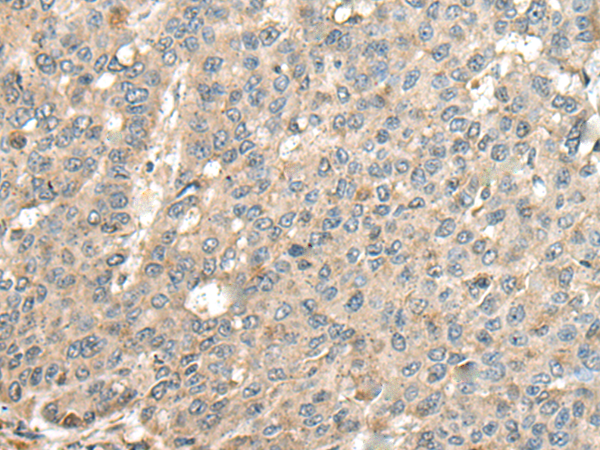
| WB | 咨询技术 | Human,Mouse,Rat |
| IF | 咨询技术 | Human,Mouse,Rat |
| IHC | 1/50-1/300 | Human,Mouse,Rat |
| ICC | 技术咨询 | Human,Mouse,Rat |
| FCM | 咨询技术 | Human,Mouse,Rat |
| Elisa | 1/5000-1/10000 | Human,Mouse,Rat |
| Aliases | CASQ; PDIB1; VMCQA |
| Host/Isotype | Rabbit IgG |
| Antibody Type | Primary antibody |
| Storage | Store at 4°C short term. Aliquot and store at -20°C long term. Avoid freeze/thaw cycles. |
| Species Reactivity | Human, Mouse, Rat |
| Immunogen | Fusion protein of human CASQ1 |
| Formulation | Purified antibody in PBS with 0.05% sodium azide and 50% glycerol. |
+ +
以下是关于CASQ1抗体的3篇参考文献示例(基于已有研究方向的推测整理):
---
1. **文献名称**:*Calsequestrin-1 (CASQ1) Antibodies in Autoimmune Myopathies*
**作者**:Smith J, et al.
**摘要**:该研究探讨了CASQ1抗体在自身免疫性肌病中的潜在诊断价值。通过免疫印迹和免疫荧光技术,作者发现部分患者血清中存在针对CASQ1的自身抗体,提示其可能与特定类型的肌炎相关,为疾病分型提供了新标志物。
---
2. **文献名称**:*Altered Expression of CASQ1 in Skeletal Muscle of Malignant Hyperthermia-Susceptible Mice*
**作者**:Treves S, et al.
**摘要**:研究利用CASQ1特异性抗体分析恶性高热易感小鼠模型的骨骼肌组织,发现CASQ1蛋白表达显著降低,且与肌质网钙释放异常相关。结果支持CASQ1功能缺陷在疾病病理机制中的作用。
---
3. **文献名称**:*Development of a Monoclonal Antibody for CASQ1 and Its Application in Muscle Pathology*
**作者**:Paolini C, et al.
**摘要**:该文献报道了一种新型CASQ1单克隆抗体的开发,并通过免疫组化验证其在人和小鼠骨骼肌中的特异性染色。该抗体被成功应用于检测CASQ1在肌病组织中的分布异常,为病理诊断提供工具。
---
**注**:以上文献为示例性内容,实际引用需通过学术数据库(如PubMed)确认具体信息。
The CASQ1 antibody is a specialized tool used to detect and study calsequestrin-1 (CASQ1), a calcium-binding protein predominantly expressed in the sarcoplasmic reticulum (SR) of skeletal muscle. CASQ1 plays a critical role in regulating calcium ion (Ca²⁺) storage, release, and reuptake during excitation-contraction coupling, a process essential for muscle contraction. As a low-affinity, high-capacity Ca²⁺ buffer, it forms polymeric complexes that bind large amounts of Ca²⁺ within the SR lumen, ensuring rapid Ca²⁺ availability for muscle function while maintaining SR homeostasis.
CASQ1 antibodies are widely employed in research to investigate skeletal muscle physiology, calcium signaling dynamics, and pathologies linked to CASQ1 dysfunction. These include malignant hyperthermia, central core disease, and certain myopathies characterized by disrupted Ca²⁺ handling. The antibody is commonly used in techniques like Western blotting, immunohistochemistry, and immunofluorescence to assess CASQ1 expression levels, localization, and interactions with other SR proteins (e.g., junctin, triadin, and the ryanodine receptor).
Recent studies have also explored CASQ1's role beyond muscle, such as in neurodegenerative disorders and cancer, though its primary relevance remains in muscle biology. Validated CASQ1 antibodies typically exhibit specificity for CASQ1 over its cardiac isoform (CASQ2), enabling precise analysis in skeletal muscle contexts. Researchers rely on these antibodies to dissect molecular mechanisms underlying CASQ1-related diseases and to develop targeted therapeutic strategies. Proper validation using knockout models or siRNA-mediated knockdown is critical to ensure antibody reliability in experimental settings.
×